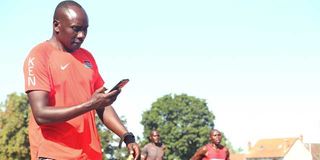Premium
Paris Paralympics: Will experience deliver gold for Kenya?

Kenya Paralympics athletics head coach Henry Kirwa monitors a team training session at Compiegne Community Stadium, France on August 12.
After an underwhelming performance at the 2021 Tokyo Paralympics and 2024 Kobe World Para Athletics Championships where the country failed to win a single gold medal, Kenya National Paralympic Committee (KNPC) decided to revamp their coaching department.
The committee deliberately recruited some of Kenya’s most accomplished Paralympians as coaches as they targeted redemption at the Paris Paralympic Games starting on August 28 to September 8 in the French capital.
Henry Kirwa, decorated Paralympian Abraham Tarbei and Joseph Mosonik the coach of 2016 Rio Olympics javelin thrower Julius Yego are some of the personnel KNPC has vested their hopes on to harvest gold in Paris.
Paris Paralympics
Kirwa, 51, who is now the athletics team head coach for the Paris Paralympics, claimed an unprecedented three gold medals from the 2008 Beijing Paralympics in 1,500m and 5,000m T13 and 10,000m T12.
In total, he has an individual count of six Paralympic medals -- four gold and two bronze.
Tarbei has four medals; three gold and one bronze from the Olympics.
Tarbei on the other hand won 5,000m and 1,500m T46 gold medals in the 2008 Beijing and 1,500 T46 gold, bronze in 800m T46 from the London Games.
Mosonik is handling Africa javelin silver medallist Sheila Wanyonyi while the 2012 London and 2016 Rio Paralympian Henry Nzungi is coaching Samson Ojuka.
“Kirwa and Tarbei have gradually transited from athletes to coaching and we needed to tap into their rich knowledge in para-athletics,” said KNPC technical director Joseph Ochieng.
Ochieng said that when they took office in May last year, the welfare of para-athletes had been neglected.
“We are determined to rectify that and that is why we brought in seasoned hands to handle our athletes.
“We are already seeing great improvement after we landed here in Compiegne,” said Ochieng, explaining that the athletes were training on murram surface in Kapsabet but are now getting used to tartan in Compiegne.
Desired results
Kirwa said that the move to bring the athletes early to camp in Kapsabet, then on to Compiegne, north of Paris, will likely produce the desired results.
“The camp back home built our stamina and endurance while we are here in Compiegne for speed work,” said Kirwa.
Kirwa said the three Kenyan women in 1,500m T11 should win some medals for Kenya with Wesley Sang also looking in great shape in the men’s 1,400m T46.
“Samwel Mushai has picked up well and can easily reclaim his 5,000m T11 title while John Lokedi’s speed and endurance was lacking,” said Kirwa.
Tarbei said they have resorted to the basics of the game in building the athletes’ stamina and endurance through hill work training and long runs.
“We took them to the routes we used during our training when we were representing the country. It’s quite nostalgic,” said Tarbei.
Kirwa and Tarbei, who were among the first athletes to benefit from the cash rewards introduced by the late President Mwai Kibaki in 2008, advised the athletes to invest well in the money they get from representing Kenya wisely.
They have also called on the government to consider the disabled when constructing new stadiums so that they can easily access the venues for training and also to position the country to host major events like the Paralympics qualifiers.





